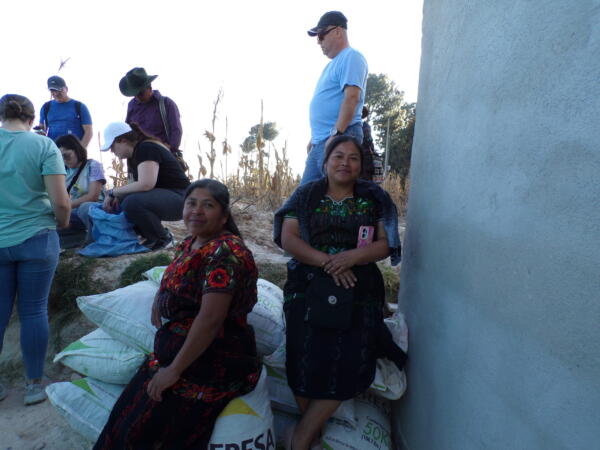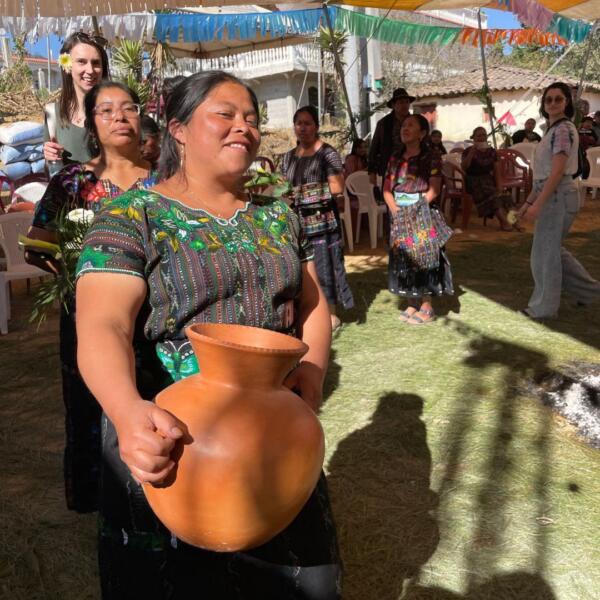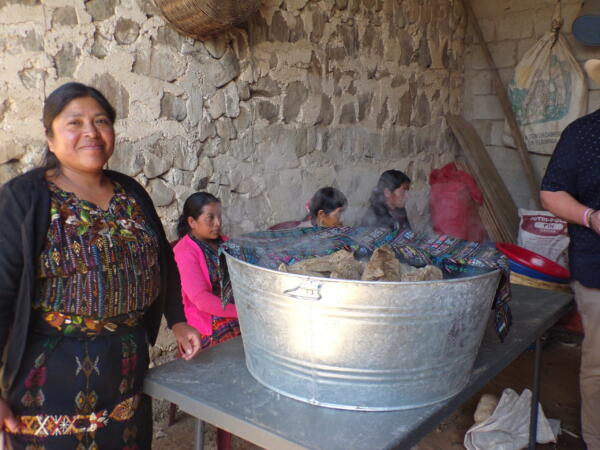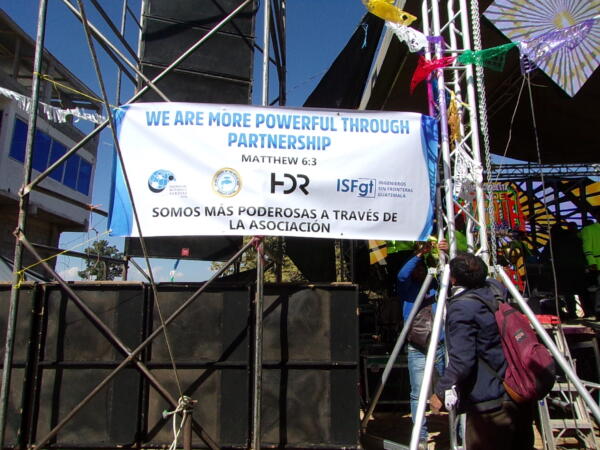Engineering Resilience In the ‘Place With No Water'. Insights from community leaders Christina and Juana Ajcalon
In the heart of Guatemala, about a 40-minute drive from Panajachel, a hotspot for international backpackers and local vacationers alike, is the community of Chaquijya. The small community has a rich culture, with both Mayan and European influences. Rooted in Kaqchikel, the local Mayan language spoken throughout the area, “Chaquijya” roughly translates to mean “scarce water, dry water, or the place with no water.” But today, in “The Place With No Water”, the taps are open, and clean water flows freely.
Earlier this year Engineers Without Borders USA, in partnership with Chaquijya’s Community Water Committee, Ingenieros Sin Fronteras Guatemala, HDR, and Matthew 6:3, celebrated the completion of an extensive water system in Chaquijya. The system includes a well with an electric pump, that pushes water up to the treatment system and a massive storage tank on top of the community’s highest hill. From the top of the slope, water from the tank is distributed throughout the community to 226 tap connections. Those tap connections support the 150 existing structures and homes in the community, including the health center and the schools. The additional 76 connections mean that there is plenty of water to go around- with tap stands available in communal areas for all to use as well as connections located on open lots which allow for young families to grow and build homes with water access.

We interviewed many of the community leaders who worked to build resilience against water scarcity; this article is the first of a short series getting to know them. While volunteer engineers met with the local construction crew and the water committee to review the project’s completion on put the final touches on an operating manual, we had the chance to step aside with Christina and Juana Ajcalon, the newly elected Vice President and Treasurer, respectively, of Chaquijya’s water committee. Here’s what they had to say:
What was day-to-day life like in the community before this water system was completed?
Juana Ajcalon: Before the project, we had water scarcity. We took turns every 3 days so that the water could come down to our houses, but the months when there’s more water scarcity are January, February, March, April, the water was totally scarce so we took turns to get a little of water but thanks to God and thanks to you, thanks to the engineers without borders for this great project that you gifted us and now we have enough water, enough water to cover the household’s needs.
What made you decide to join the water committee?
Christina: It is important because the water is useful every day. Whenever we, the women, wake up in the morning, the first thing to secure is the water to do the laundry, wash the dishes, and also for the children’s hygiene; that’s why we need the water, and we are really happy because we have it now and we are also happy because there is a lot of water.

What has your experience been like working with Engineers Without Borders USA on this project?
Juana Ajcalon: This has been a very nice experience. As women, we only take care of the household, and the children, we are responsible for the household chores, but nowadays there’s no difference between men and women, we have the same equality to work as a team, men and women, and in this time we are the same, men and women work the same. So it is a nice experience to be able to see how the water reaches our homes. Before, we would only open the tap and there’s water, but now the committees have a process about how the water reaches our homes. So now, we understand what a valve is, how to connect a hose, how to install a tee, and I know these are like little things, but it is a nice experience to know all of that. At this moment, we understand how the water flows to the tank…it’s the beauty of water, but knowing that there’s a process with the engineers and how they made studies and then built it…it is a nice experience.
How will this project change your day-to-day life now that it is complete?
Christina: We are able to change our hygiene because now we have water. We feel happy because we have water now.
Juana Ajcalon: Yes, and now we can have more animals, we can grow vegetables, we can grow flowers, we can water them with enough water, now we can do more projects at home, we can do more stuff because we have water available at our homes.
What kind of animals and plants and vegetables are you looking forward to?
Juana Ajcalon: I want to have everything. I want to have vegetables. If I want to cook, I just pick the vegetables and cook them, because there’s a garden at the house. [I hope there] would be carrots, potatoes, beans, corn. The animals would be chickens.
Are there any foods that you’re more excited to cook or that you’re excited to cook more often now that the water project is almost complete?
Christina: I am excited because there’s enough water to clean the vegetables, to cook the food. There’s enough water because last year, when we didn’t have water it was so difficult, but now that we have water I feel happy because I can prepare breakfast, lunch, and dinner. I am happy! We like soup, and also beans with eggs because that’s what we usually cook here.
What made you take on the roles that you have within Chaquijya’s water committee?
Christina: We are working, we are the women [on the water committee] and we have to know what the project is about, and we are working together with fellow women [volunteers] who are engineers and learning I wanted to learn from them.
Juana Ajcalon: I have some previous experience as the treasurer of another committee in the community. In that role, I earned the people’s trust. When they did this new election of the president, spokesperson, and all, they elected me to be the treasurer.

The completion of the extensive water system in Chaquijya, Guatemala, marks a transformative milestone in the community’s history. Once burdened by water scarcity, the community now thrives with abundant access to clean water, thanks to the collaborative efforts of Engineers Without Borders USA, Ingenieros Sin Fronteras Guatemala, HDR, and Matthew 6:3. Through interviews with community leaders like Christina and Juana Ajcalon, the project’s profound impact on daily life becomes evident, inspiring women, fostering unity, and unlocking new opportunities for growth and prosperity. As taps flow freely and dreams take root, Chaquijya stands as a testament to the enduring power of collective action and compassion in overcoming adversity and building a brighter future.

Want to receive more good news like this?
Donate now to Engineers Without Border’s USA’s Climate Resilience Initiative
by visiting Climate Page
With your support, we can engineer resilience and make more projects like this one possible!
Not ready to donate?
That’s okay- we understand!
Subscribe to our newsletter below or follow us on LinkedIn, Instagram, or YouTube, and stay tuned this week as we dive deeper into the stories of Christina, Juana, and other women who are engineering resilience.
